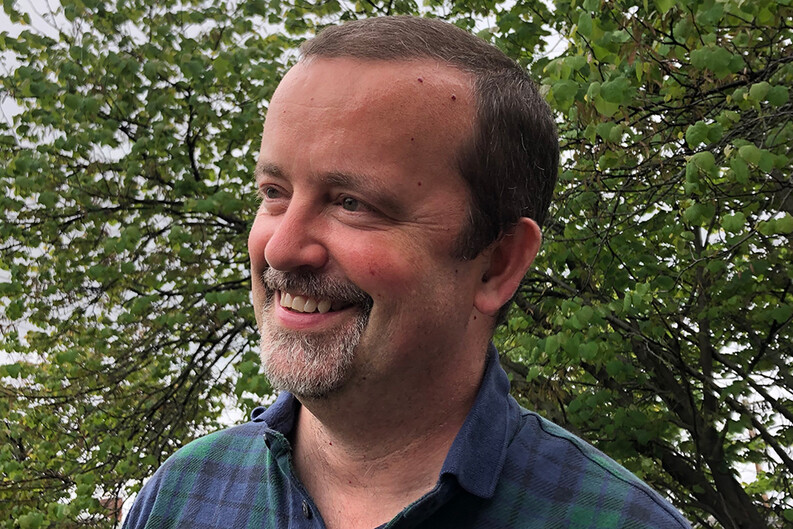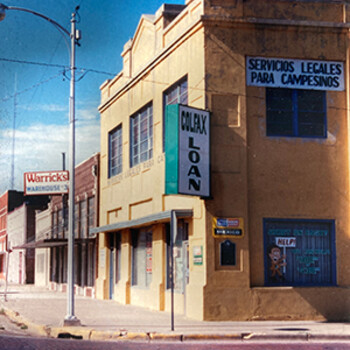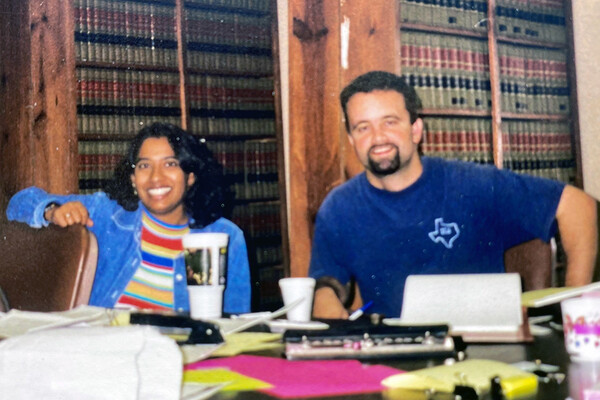Q&A: Liman Fellow Doug Stevick ’96 on Lawyering Off the Beaten Path

Douglas L. Stevick ’96 was a 1998 Liman Fellow4 at Texas Rural Legal Aid (TRLA), now known as Texas RioGrande Legal Aid, where he is currently a General Counsel. Since graduating from Yale Law School, he has lived in Texas (Laredo, Plainview, Weslaco, and Fort Worth); Nashville, Tennessee; and St. Louis, Missouri. He also spent a year each in Washington, D.C. and New York City.

Why did you decide to spend your fellowship year in Texas with TRLA?
It’s kind of a long story, in part for idiosyncratic life-history reasons.
I did my Liman Fellowship at TRLA’s now-shuttered farmworker legal services office in Plainview, Texas, which is about halfway between Lubbock and Amarillo in the Texas Panhandle. How I ended up in Plainview was a bit complicated. I had spent half of my 1L summer at TRLA-Plainview because I had lived in Lubbock for three years as a kid in the late 1970s while my father got his doctorate at Texas Tech University (which makes me one of the few human beings who instantly associates Lubbock with disco music), and I was intrigued at the prospect of returning to the region with grown-up eyes. I learned of the opportunity through the TRLA recruiter I met at the NYU public interest job fair in February of my 1L year. He was great — he’s still a friend — and he sold me pretty hard (and successfully) on taking the chance to do important legal work off the beaten path. And, really, what’s the downside of spending half of one of your law school summers doing something wacky?
It turned out that I had a spectacular time at TRLA-Plainview working on compelling farmworker sexual harassment and wage-and-hour litigation. I was shocked and appalled at how the pathetically basic things I had taken for granted at a workplace in my white-middle-class-kid-from-the-suburbs kind of way — no one trying to grope me, getting a paycheck with proper deductions, getting paid on time — were so easily and cavalierly denied to low-wage workers of Mexican descent.
When the opportunity opened up for me to return to TRLA-Plainview for my Liman Fellowship, I jumped at the chance. My 2L summer jobs — at the State Department’s Office of Legal Advisor and with a big defense-side law firm — were fine, but I wasn’t waking up every morning jumping at the prospect of going to work. And while my first post-clerkship job with a major public interest legal nonprofit in D.C. was wonderful, I felt fungible — I was just another Ivy-league law grad in D.C. who could have filled that position.
“All those great precedents from New York and D.C. and Chicago and L.A. and San Francisco don’t count for much in Plainview, Texas, or Saint Louis, Missouri, or Pine Bluff, Arkansas, unless someone is there locally to bring and win those fights.”
— Doug Stevick ’96
Not every YLS lawyer, on the other hand, was chomping at the bit for the chance to move to Plainview, population 23,000.
What are the challenges and advantages of working outside of an urban region?
One challenge of working off the beaten path is that there often aren’t a whole lot of people like you, unless you’re from the area. When I lived in D.C., I could hardly walk around Dupont Circle without bumping into someone I knew. But in rural Texas I had to drive to Lubbock or Amarillo (or Austin or Dallas) to find more than isolated pockets of people like me.
An advantage of working outside of coastal cities is that you have a chance to make an impact that would likely not otherwise be made. All those great precedents from New York and D.C. and Chicago and L.A. and San Francisco don’t count for much in Plainview, Texas, or Saint Louis, Missouri, or Pine Bluff, Arkansas, unless someone is there locally to bring and win those fights.
I have also found that the bonds I have forged with fellow travelers in these less-traveled areas are deep and lasting. Indeed, during my Liman Fellowship I met the woman who is now my wife when we were working in separate TRLA farmworker legal services offices, me in Plainview and she on the Texas-Mexico border (although we didn’t start dating until we had both left TRLA to very temporarily pursue the fuzzy rewards of lawyering in New York City and D.C., respectively). Working at a take-no-prisoners, mission-driven organization like TRLA in an out-of-the-way place is a remarkably effective screening device for meeting potential life partners who share your core moral and political commitments!
And did I mention that the cost of living is often absurdly low? It makes living on a public interest salary much more doable than it is on the coasts.

What is the most significant impact you had?
There were very few lawyers fighting for the working poor, particularly Mexican-Americans, in the Texas High Plains, so virtually any lawsuit that we brought made a difference, particularly on just a basic level of vindicating the principle that everyone should be treated with a minimum level of human dignity. On a more technical level, my Liman Fellowship helped me develop an expertise in settlement-related tax issues for low-income workers that I have been able to deepen and share with nonprofit and private employment lawyers across the country over the past 25 years.
What advice would you give to future Yale Law School graduates who are deciding where to spend their fellowship year?
The YLS grads with whom I’ve worked here in flyover country like to joke that one of the most common maladies of Yalies is coastalitis — if the job’s not in D.C. or NYC or some such place, it’s not desirable. Get off the treadmill and take a risk by working on a fellowship for a year or two somewhere off the beaten path! You’ll learn a ton, you’ll have experiences you’d otherwise never have had, and you’ll be given more responsibility early on in your legal career than you could get almost anywhere else. (I was the lead lawyer in federal trial court litigation starting day one of my time at TRLA.) Your options will still be open after a fellowship to move to the coast and have a more traditional public interest legal career. And you never know — you might turn out to be someone like me who sticks it out for decades in the less-traveled parts of the country.


